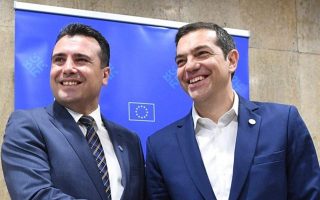New North Macedonia PM describes country’s constitutional name as ‘shameful’

North Macedonia’s new prime minister has described as “shameful” the inclusion of the designation “North” in the constitutional name of the country but said he was required to “capitulate” to its use as it was now part of the country’s legal system.
Hristijan Mickoski was speaking late Sunday shortly before his center-right party secured parliamentary approval to lead a new coalition government in a vote.
While Mickoski referred to the state as “Macedonia” during the two-day parliamentary debate leading to Sunday’s vote, he used the country’s constitutional name, Republic of North Macedonia, in his swearing-in oath.
“I say that this designation, which I have to state during my swearing-in, is shameful, as it reminds me personally of the shame you have brought to my country, my family and my unborn grandchildren and those who will come after them,” he said.
“And as long as I live, both politically and as a person, I will do everything in my power to right this injustice.”
Mickoski, 46, faces significant challenges in his four-year term in office – above all to advance the NATO member’s lengthy efforts to join the 27-nation European Union.
At the same time, his VMRO-DPMNE party’s nationalist bent is antagonizing neighboring EU members, in stark contrast to the previous center-left government it defeated in May’s national elections.
A total of 77 lawmakers in the 120-seat house voted in favor of the new government, and 22 voted against. The remaining 21 lawmakers were absent during the ballot.
Mickoski’s VMRO-DPMNE-led coalition gained 43% of the vote on May 8, winning 58 seats – three short of a governing majority. Mickoski then struck a deal to form a government with an ethnic Albanian and a leftist party, which together have 20 seats.
Mickoski, a former professor of engineering, has pledged to continue his center-left predecessors’ efforts to shepherd North Macedonia into the EU.
However, VMRO-DPMNE’s questioning of key agreements with neighboring Bulgaria and Greece – both of which can block North Macedonia’s accession – could put the brakes on the EU project, said political analyst Petar Arsovski.
VMRO-DPMNE “basically demands a reinterpretation of both the [Prespa deal with Greece] and the agreement with Bulgaria,” he told The Associated Press.
“They will face a serious challenge from the international community, which will treat these agreements as a done deal,” he said. Arsovski added that the center-right party must also keep happy its own conservative voters whose expectations it raised during campaigning.
“I don’t expect them to make a breakthrough too quickly on any of those issues,” Arsovski said.
North Macedonia joined NATO in 2019 after a historic deal with Greece to change its official name from Macedonia, following decades of disputes over history and cultural heritage.
But VMRO-DPMNE has made clear its distaste for the agreement.
North Macedonia’s new President Gordana Siljanovska Davkova – a VMRO-DPMNE candidate – had already riled Greek and EU officials by doing the same when she took the formal oath of office. She later insisted that she had a “human right” to refer to her country as she liked.
Relations with Bulgaria are also likely to suffer. North Macedonia’s previous government had accepted – but failed to win parliamentary backing for – a Bulgarian demand to recognize a Bulgarian minority through constitutional amendment. In exchange, Bulgaria had agreed to drop its objections to North Macedonia joining the EU.
VMRO-DPMNE has denounced the prospect of a constitutional amendment as a “capitulation [to] Bulgarian dictates.”
EU membership negotiations with North Macedonia and neighboring Albania began in 2022 and are expected to take years.
Mickoski’s domestic challenges include strengthening the rule of law while addressing corruption and poverty and reviving a sluggish economy.
On Saturday, he promised to cut taxes and raise pensions, while growing the economy by 5% this year and cutting inflation to no more than 2.5%. [AP, Kathimerini]




